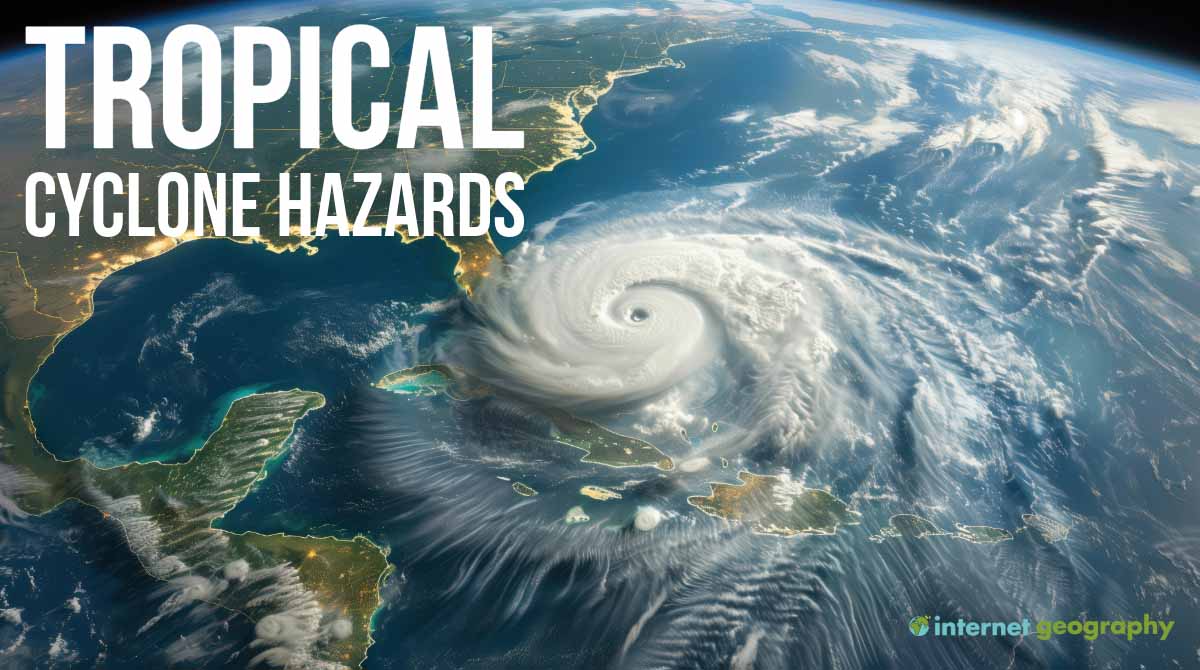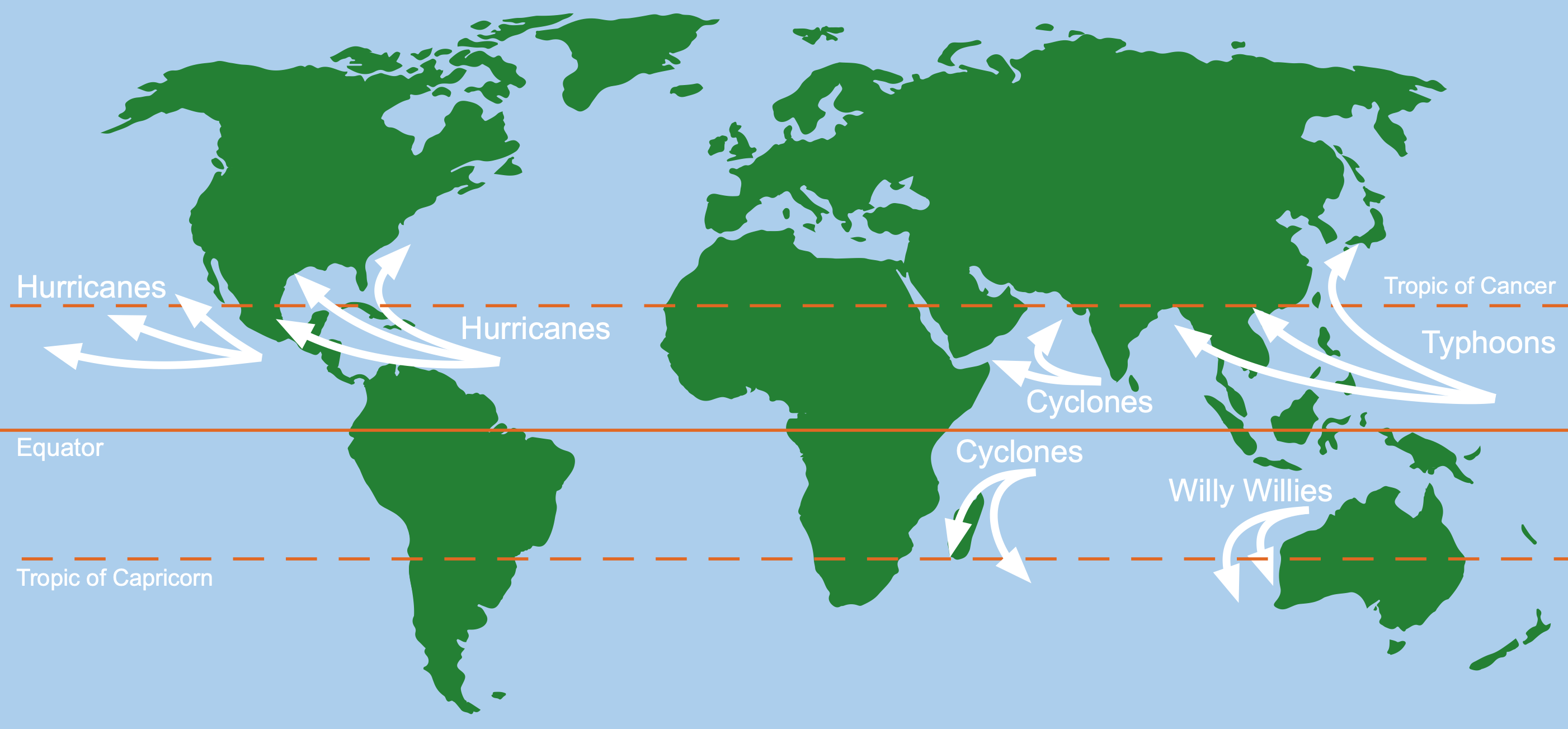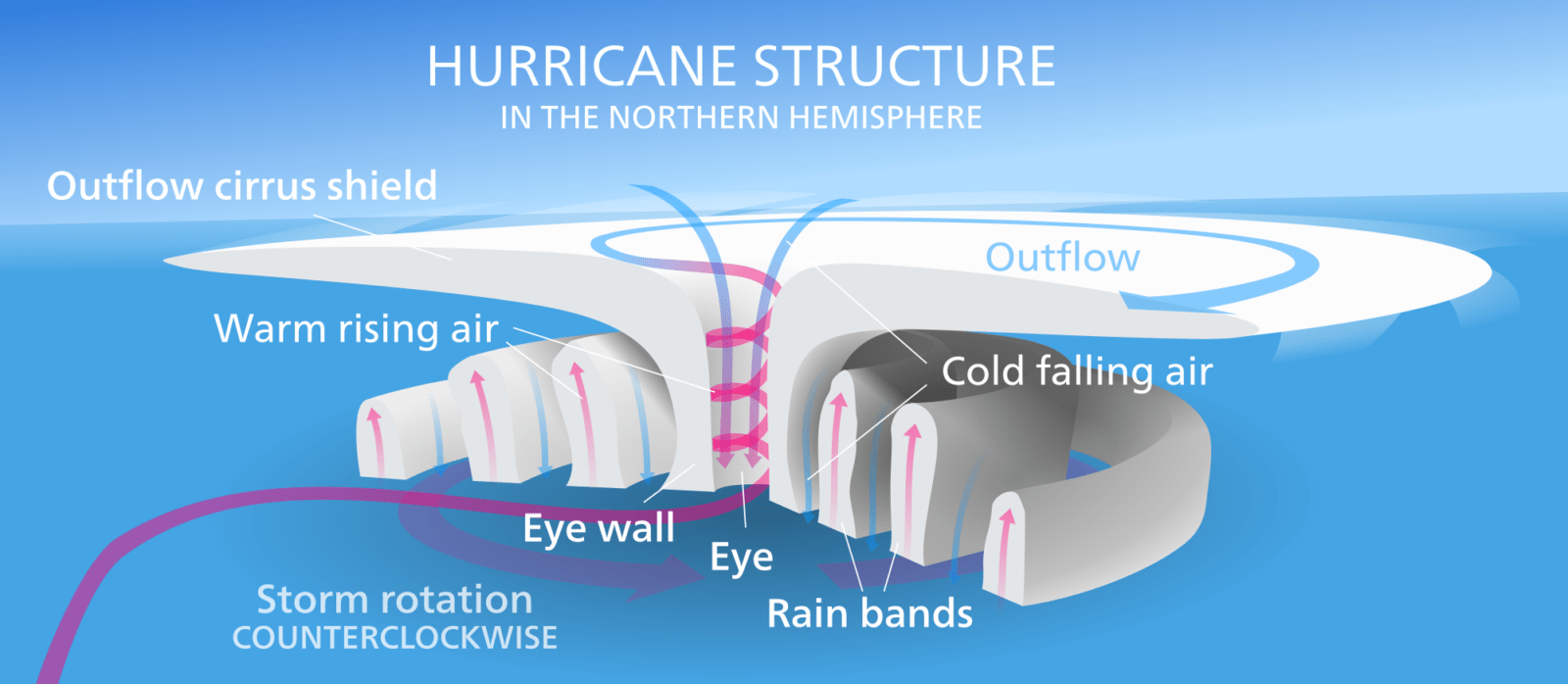
What are tropical cyclones?
Tropical cyclones, also called hurricanes in the USA and the Caribbean or typhoons in Asia, are powerful storms that can cause heavy rain, strong winds, and large waves. These can lead to other problems like flooding and mudslides.
Tropical cyclones are intense and can affect large areas, but predicting their exact path is difficult. They develop quickly, and while they may move slowly at first, their direction can be unpredictable.
Tropical cyclones are powerful low-pressure systems that form over warm tropical oceans, drawing in vast amounts of moisture from the sea. This moisture fuels the storms, resulting in extremely heavy rainfall, sometimes reaching up to 500 mm within 24 hours, which often causes severe flooding.
The structure of a tropical cyclone includes a calm, central area known as the eye, around which strong winds spiral rapidly. These winds are concentrated in a belt up to 300 km wide, although the overall storm can stretch as much as 800 km in diameter.
The movement of tropical cyclones is highly unpredictable, making it difficult to provide more than 12 hours’ warning, which can be inadequate for full-scale evacuations. At their peak, the central pressure of a tropical cyclone can drop to around 880 millibars. The sharp difference in pressure between the eye and the storm’s outer edges creates potent winds capable of causing significant damage.
What is the global distribution of tropical cyclones?
Tropical cyclones typically form between 5° and 30° latitude, both north and south of the equator, and are most common in late summer and autumn. They move westward because of easterly winds and often shift towards the poles as they develop. These storms help transfer heat from the tropics to higher latitudes.

The distribution of tropical cyclones
Tropical cyclones usually form in areas of warm, westward-moving air near the equator, often starting as small tropical depressions. These depressions are low-pressure systems where warm air rises, creating thunderstorms that last at least a day. These systems sometimes intensify into tropical storms with wind speeds up to 117 km/h (73 mph). However, only about 10% of tropical disturbances grow into full tropical cyclones with wind speeds exceeding 118 km/h (74 mph).
What are the causes of tropical cyclones?
Tropical cyclones require specific conditions to develop:
- Warm Seas: Ocean temperatures must be at least 27 °C, with a layer of warm water at least 70 metres deep. This provides the energy for the cyclone, as heat is released during the condensation of water vapour.
- Sufficient Distance from the Equator: Cyclones cannot form near the equator because the Coriolis effect, which causes air to rotate, is too weak. Without this rotation, a storm system cannot organise into a cyclone.
- Consistent Wind Directions: The winds at different heights in the atmosphere must move in the same direction. If wind shear (differences in wind speed or direction) is too strong, it can disrupt or prevent the cyclone from forming.
- Unstable Weather Patterns: Some low-pressure systems in tropical regions intensify into cyclones, while others do not. Scientists are still investigating why only certain systems develop into storms.
The formation of tropical cyclones
- Initial Development: A low-pressure system begins moving westward over warm ocean waters. The high sea temperatures promote rapid evaporation, causing warm, moist air to rise.
- Cloud Formation: As the warm air rises, it cools and condenses into towering cumulonimbus clouds. The condensation process releases heat energy, intensifying and sustaining the storm.
- Spiral Movement: The rotation of the Earth causes the rising warm air to spin around the storm’s centre. The hot, rising air creates very low pressure at the surface, drawing in air from surrounding high-pressure zones to balance the pressure difference.
- Winds and Eye Formation: Winds spiral inward and downward near the surface, converging at the storm’s centre. This creates the characteristic calm eye of the storm surrounded by intense winds and rainfall.
- Landfall and Dissipation: When the cyclone reaches land, it begins to weaken because it loses its main energy source—the heat and moisture from the ocean. This causes the storm to break apart over time.
What is the structure of a tropical cyclone?

The structure of a tropical cyclone
What hazards are associated with tropical storms?
These storms are marked by heavy rainfall and extreme winds that can lead to devastating storm surges, coastal flooding, and inland hazards like river flooding and landslides. The severity of tropical cyclones can vary, with stronger systems causing more significant and widespread damage.
How are tropical cyclones measured?
Tropical storms are assessed using the Saffir-Simpson Hurricane Wind Scale, which ranks storms based on their wind intensity. This scale categorises storms into five levels, from Category 1 (the least intense) to Category 5 (the most severe), providing an indication of the potential damage and flooding that could occur when the storm reaches land.
Key factors influencing the scale include:
- Wind Speed: Higher wind speeds result in more damage and a higher category on the scale.
- Coastal Characteristics: The shape of the coastline can amplify storm impacts. Shallow coastal slopes and funnel-shaped coastlines are particularly prone to larger storm surges.
While the scale is widely used, it has limitations. It was initially designed to focus on the United States, incorporating factors like damage to mobile homes, which may not apply universally. In many parts of the world, informal settlements with poorly constructed dwellings are highly vulnerable to tropical storm winds, even at lower intensities. This highlights the scale’s limitations in reflecting the full range of global impacts.
The impacts of different types of tropical storms are illustrated below:
| Category | Features | Impact |
| 1 | Category 1: Winds 119-153 km/h; storm surge generally 1.2 – 1.5 m above normal; air pressure greater than or equal to 980 mb | Minor damage occurs to buildings, mainly limited to unsecured mobile homes. There can be some flooding on coastal roads and minor damage to piers. |
| 2 | Category 2: Winds 154-177 km/h; storm surge generally 1.8 – 2.4 m above normal; air pressure 965-979 mb | Moderate damage such as to roofing materials, windows and doors. Piers and vegetation experience considerable damage. Flooding to coastal and low-lying areas 2-4 hours before the eye of the storm arrives. Small boots located in unprotected areas break from moorings. |
| 3 | Category 3: Winds 178-209 km/h; storm surge often 2.7 – 3.6 m above normal; air pressure 945 – 964 mb | Smaller houses and utility buildings may suffer structural harm, and mobile homes could be destroyed. Coastal flooding can obliterate small structures, with larger buildings incurring damage from debris. Residents in low-lying shoreline areas might need to evacuate. |
| 4 | Category 4: Winds 210-249 km/h; storm surge often 3.9 – 5.5 m above normal; air pressure 920 – 944 mb | Extreme damage is caused, including complete roof structures on smaller properties. Doors and windows experience extensive damage. Land that lies 3m below sea level may be flooded, requiring extensive evacuation as far as 10km from the coast. |
| 5 | Category 5: Winds greater than 252 km/h; storm surge typically greater than 5.5 m above normal; air pressure >920 | Many homes and industrial buildings may experience complete loss of roofs. Some smaller structures could be toppled or carried away by winds. Escape routes near the coast may become impassable due to rising water 3-5 hours before the tropical storm’s centre arrives. A significant evacuation could be necessary for residential zones within 8-16 km of the coast. |
Scales Used to Measure Tropical Storms
Hurricane Severity Index (HSI): The HSI measures wind speed and the storm’s size, providing a more detailed assessment of a tropical storm’s potential impact.
- It assigns a score from 1 to 50, factoring in the intensity of winds and the overall storm area.
- Accumulated Cyclone Energy (ACE):The ACE index calculates a tropical storm’s total energy based on wind speed and duration.
- This scale compares tropical storm activity over an entire season or across regions.
Australian Tropical Cyclone Intensity Scale: This scale categorises tropical cyclones into five categories based on sustained wind speeds over a 10-minute average.
- Categories range from Category 1 (weakest) to Category 5 (strongest), with Category 5 storms having sustained winds exceeding 200 km/h.
Indian Meteorological Society Cyclone Scale: In the North Indian Ocean, this scale classifies cyclones based on wind speed and intensity. Cyclones are categorised into several stages:
- Depression: Wind speeds of 31–49 km/h
- Deep Depression: 50–61 km/h
- Cyclonic Storm: 62–88 km/h
- Severe Cyclonic Storm: 89–118 km/h
- Very Severe Cyclonic Storm: 119–221 km/h
- Super Cyclonic Storm: Winds exceeding 222 km/h
These scales provide different perspectives on measuring tropical storm intensity, focusing on wind speed, duration, and overall impact.

